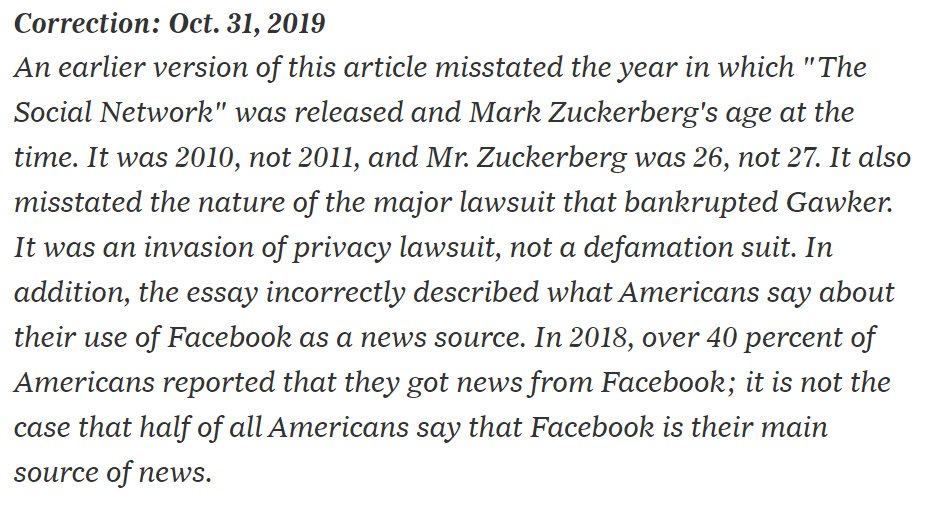This is a good thread. I think I agree with all of it. Two other things that drive anti-media feelings in SV:
1) Overly simplistic (and often multiple) positions on complicated issues
2) The lack of self-reflection on some of the same problems faced by media and tech https://twitter.com/Noahpinion/status/1249167046614663169">https://twitter.com/Noahpinio...
1) Overly simplistic (and often multiple) positions on complicated issues
2) The lack of self-reflection on some of the same problems faced by media and tech https://twitter.com/Noahpinion/status/1249167046614663169">https://twitter.com/Noahpinio...
I& #39;ve talked a lot about #1. Many tech policy controversies are due to the need to weigh multiple, important competing equities when 200 years of precedent are no longer relevant (what is hate speech in 2020?) https://youtu.be/ATmQj787Jcc ">https://youtu.be/ATmQj787J...
My colleague, @daphnehk, has written some important pieces on these trade-offs when it comes to regulating speech. https://www.hoover.org/research/who-do-you-sue">https://www.hoover.org/research/...
It& #39;s important for the media to explore these areas, and many straight news pieces do surface the complexities. However, on the opinion pages and in hybrid opinion-reporting (like Vox), the immediate assumption is that any decision made by tech was driven by malintent.
It& #39;s extremely frustrating to spend your career working on hard problems and to see your work derided by people who haven& #39;t taken the time to understand the issue or, more likely, have convinced themselves that the right decision is clear, simple and obvious.
One of my most frustrating moments with the tech media was when a colleague (an ex-sex crimes prosecutor) took a personal risk to launch an experimental response to non-consensual intimate imagery (aka revenge porn) and ended up being pilloried by much of the tech media.
This shallow reaction has real impact. Support in the company withered. Everybody else in tech saw what would happen if you tried to do something risky, even if you had good intentions.
Not a single other platform has shipped a preventative NCII reporting mechanism since.
Not a single other platform has shipped a preventative NCII reporting mechanism since.
Frustrations with this pattern are amplified by repeated failures to understand the basic facts. The NY Times continues to confuse data sharing between companies and allowing users to use 3rd party clients. The speech moderation debate has lead to some awesome corrections:
On #2... the post-2016 backlash against social media was earned. It was also mostly non-empirical, emotionally driven and, coincidentally, completely devoid of self-reflection of how the US media was also completely played by the GRU. https://twitter.com/Noahpinion/status/1249174913719697410">https://twitter.com/Noahpinio...
Here is a thread with one of the best examples of how establishment media figures have been able to seal themselves off from any shared responsibility for the information ecosystem disasters of 2016. https://twitter.com/alexstamos/status/1223661900065472512">https://twitter.com/alexstamo...
This also has real impact. While the biggest* relevant tech companies have published new policies, built teams and changed their products, I have yet to see a major media organization publish a review of 2016 and how their standards have changed.
*there is still a long tail
*there is still a long tail
My colleagues, @janinezacharia and @GrottoAndrew, have some ideas on how to handle equivalent attempts to manipulate the media in 2020:
https://fsi-live.s3.us-west-1.amazonaws.com/s3fs-public/full_report_download_-_how_to_report_responsibly_on_hacks_and_disinformation.pdf">https://fsi-live.s3.us-west-1.amazonaws.com/s3fs-publ...
https://fsi-live.s3.us-west-1.amazonaws.com/s3fs-public/full_report_download_-_how_to_report_responsibly_on_hacks_and_disinformation.pdf">https://fsi-live.s3.us-west-1.amazonaws.com/s3fs-publ...
I think the VC in question (I shall not speak his true name here) has gone overboard, and is taking perverse glee in the economic damage to the press. I don& #39;t think "citizen journalism" can generate the critical early coverage of COVID in China upon which predictions were based.
But this isn& #39;t all culture war: the press needs to do better at covering difficult trade-offs in tech. It needs to not assume techies are malicious. Opinions should be based on empiricism, not emotion. And some public self-reflection wouldn& #39;t hurt.
One more thing: tell your lobbyists to stop backing the EARN-IT war against cryptography. It& #39;s really hard to take reporters seriously on privacy when their employers are arguing against the speech rights of individuals in the context of threatening E2EE.
http://www.newsmediaalliance.org/wp-content/uploads/2020/02/News-Media-Alliance-Sec.-230-Testimony-FINAL.pdf">https://www.newsmediaalliance.org/wp-conten...
http://www.newsmediaalliance.org/wp-content/uploads/2020/02/News-Media-Alliance-Sec.-230-Testimony-FINAL.pdf">https://www.newsmediaalliance.org/wp-conten...

 Read on Twitter
Read on Twitter



